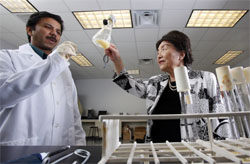 Officials with Green Tech America Inc. have announced that they are producing a more efficient way to produce cellulosic ethanol with a new type of yeast. According to a Purdue Research Park press release, the feedstocks involved include: wood chips, grasses and agricultural wastes like corn stalks and wheat straw. The new yeast ferments both glucose and xylose, two major types of sugar recovered from cellulosic biomass. Conventional yeasts ferment only glucose.
Officials with Green Tech America Inc. have announced that they are producing a more efficient way to produce cellulosic ethanol with a new type of yeast. According to a Purdue Research Park press release, the feedstocks involved include: wood chips, grasses and agricultural wastes like corn stalks and wheat straw. The new yeast ferments both glucose and xylose, two major types of sugar recovered from cellulosic biomass. Conventional yeasts ferment only glucose.
The yeast was developed at Purdue University by Nancy Ho (pictured), a research professor in the School of Chemical Engineering, in the Laboratory of Renewable Resources Engineering and the Energy Center. She also is founder and president of Green Tech America.
Green Tech America, which is based in the Purdue Research Park, also received exclusive license for improvements to the new yeast to be developed by Green Tech. “We licensed the yeast so we can provide it as well as technical assistance to other companies so they can use it for their own cellulosic ethanol production,” Ho said. “We can produce the yeast more cost-effectively. It is similar to how few people will make their own bread at home because it is more convenient and less expensive to buy loaves in the supermarket.”
Ho’s research at Purdue has been funded by the U.S. Department of Energy, Department of Agriculture, the Consortium for Plant Biotechnology Research Inc., Environmental Protection Agency and industry sources.


 Both houses of Congress have now introduced a bill that would give consumers more choices at the pump.
Both houses of Congress have now introduced a bill that would give consumers more choices at the pump. An increasing number of university professors, scientists, researchers, and industry trade organizations have registered their opposition to the controversial proposal because they say incomplete and unproven modeling is being used to penalize renewable fuels.
An increasing number of university professors, scientists, researchers, and industry trade organizations have registered their opposition to the controversial proposal because they say incomplete and unproven modeling is being used to penalize renewable fuels.  Happy Earth Day, everybody!!
Happy Earth Day, everybody!! Sure, they might not be cast opposite stunning starlets such as Angelina Jolie or call for their closeup after jumping off a 30-story building in a spectacular stunt, but renewable energy sources, especially biodiesel and solar, are playing a starring role in Hollywood these days.
Sure, they might not be cast opposite stunning starlets such as Angelina Jolie or call for their closeup after jumping off a 30-story building in a spectacular stunt, but renewable energy sources, especially biodiesel and solar, are playing a starring role in Hollywood these days. While my friend
While my friend  With Wall Street still not recovered from the economic downturn and banks keeping a tight hold of the credit purses’ drawstrings, the next generation of biofuels producers could have a rough time getting going and staying going.
With Wall Street still not recovered from the economic downturn and banks keeping a tight hold of the credit purses’ drawstrings, the next generation of biofuels producers could have a rough time getting going and staying going. The Green Fleet Award went to Victor La Rosa, President of Total Transportation Services, Inc. (TTSI), was the first in line with alternative fuel vehicles (AFVs) to operate in full-time drayage service at the Ports of Long Beach and Los Angeles.
The Green Fleet Award went to Victor La Rosa, President of Total Transportation Services, Inc. (TTSI), was the first in line with alternative fuel vehicles (AFVs) to operate in full-time drayage service at the Ports of Long Beach and Los Angeles.  The Green Giant Award went to T. Boone Pickens (right) who has pushed national attention on natural gas for transportation as a key tenet in lessening U.S. dependence on foreign oil.
The Green Giant Award went to T. Boone Pickens (right) who has pushed national attention on natural gas for transportation as a key tenet in lessening U.S. dependence on foreign oil.  Citing the Earth Day connection, waiver petitioner
Citing the Earth Day connection, waiver petitioner